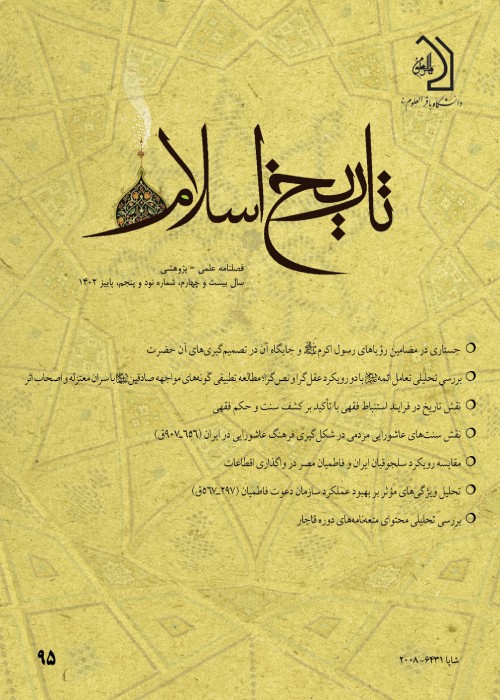PHILOSOPHY OF HISTORY IN NAHJ-UL-BALAGHAH
Imam Ali's (pbuh) views on philosophy of histiry are a clear interpretation of Qur'anic concepts. In his words philosophy of history has been taken up with a purposeful and completely self - conscious approach. The beginning and end of history are the most important parts of these reflections. He divides the whole history into three parts the creation and selection of Adam (the begining of history, the sending of the prophets (the second period of history) and the coming of the rectifying Messiah (the end of history). Based on his words, major factors in shaping human history are: 1. The ordinance of divine providence 2. Man's free will and ability to choose. Key words: divine tradition, the world and the hereafter, the viceroy of Allah. bi'thah (the sending of prophets), Ahl al-Bayt (the Prophet's Household). THUGHUR SHAMI AND àWASIM (HISTORICAL, CULTURAL AND SOCIAL DEVELOPMENTS FROM THE CONQUESTS TO THE END OF 3rd CENTURY A.H) Abbas Boroomand A'lam Since the very early years after Hijrah, Sham (Greater Syria), especially with promises of conquest made by the Prophet (pbuh) to the Muslims, was of special importance. Natural and cultural features of the region and its neighborhood to the Eastern Roman Empire had always attracted the attention of various states. Following the disintegration of the Islamic Caliphate, this caused permanent conflicts among the local and regional governments. On the other hand, the borders region always witnessed wars between the Muslims and the Byzantines. The coinage of the word thughur (Borders and وwasim (forts), in the political literature of Muslims since the early centuries A.H. and their repetition in sources, indicates the high importance of these regions. The cultural and social peculiarities of thughur and 'awasim had a significant role in shaping many regional developments and intellectual and social trends. These regions did not have a coherent ethnic and cultural identity; rather, they enjoyed a kind of fluidity in their cultural identity. For many centuries, this heritage was passed to the residents of these regions such that they always inherited the thoughts, culture and civilization of nations from the east and west of the Muslim world. They combined such diverse elements creating a new identity for themselves.
- حق عضویت دریافتی صرف حمایت از نشریات عضو و نگهداری، تکمیل و توسعه مگیران میشود.
- پرداخت حق اشتراک و دانلود مقالات اجازه بازنشر آن در سایر رسانههای چاپی و دیجیتال را به کاربر نمیدهد.


